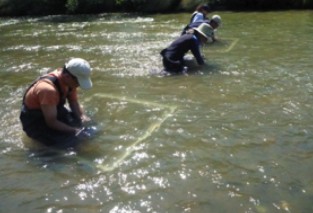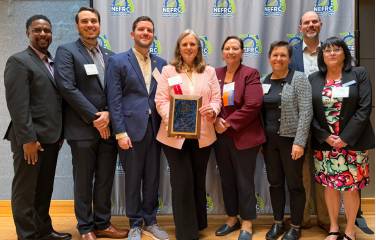Ensure That Environmental Issues Don’t Delay Your Projects
State Regulations & Requirements for Aquatic Species
Did you know that Texas is home to 52 native freshwater mussel species that are a critical component of a healthy aquatic ecosystem? Mussels serve as water quality indicators and provide an important food source for other organisms. Unfortunately, mussels are declining due to habitat loss from dam construction, sedimentation, drought, pollution, illegal and/or over-harvesting, and competition from invasive species, such as zebra mussels. In 2010, the Texas Parks and Wildlife Department (TPWD) listed 15 Texas mussel species as “threatened.” Texas law prohibits any take (incidental or otherwise) of state-listed species. According to Section 1.101(5) of TPWD Code, “take” means to hook, hunt, collect, pursue, kill, and capture or attempt to capture.
Projects involving construction within a reservoir, river and/or perennial stream in one of the highlighted counties at left may require mussel survey and/or relocation services, as these projects have a potential to result in “take” of state-listed threatened mussel species. Project types that may require mussel services include (but are not limited to) pipelines, lake and river intakes, points of discharge, dam work, boat ramp construction and maintenance, cofferdam construction, stream bank restoration, and dredging.
Of Special Note:
For all Texas construction projects involving dewatering in streams, ponds, reservoirs, stilling basins, and other flood-control structures, TPWD requires a written Aquatic Resource Relocation Plan (ARRP) to control and limit dewatering impacts. The responsible party must obtain TPWD approval of the ARRP and a project-specific relocation permit prior to initiating dewatering. The responsible party must recover and relocate fish and listed and non-listed native mussels prior to the start of construction.
Important Considerations:
Timing: Call an expert ASAP to assess state-required aquatic species survey and/or relocation activities for your project. We recommend that project-specific needs be assessed during the final design phase and/or prior to construction contractor bidding.
Avoiding Costly Delays:
TPWD may halt construction of projects for non-compliance with state-listed threatened species regulations and other requirements related to aquatic life. Also, TPWD may collect restitution values, which vary by species, for loss of aquatic life.
The Bottom Line:
Halff’s experts can help project owners overcome environmental challenges in an efficient, cost-effective manner. Working with professionals experienced in compliance with state regulations and requirements for aquatic species will help to safeguard projects against costly construction delays.

The Take-Away:
Halff provided expert guidance.
Halff had the knowledge of regulatory requirements and the resources necessary to successfully complete aquatic species relocation efforts, which allowed construction to proceed on schedule.
Halff is one of the few firms in Texas that has the experience and holds the TPWD-issued permit required to conduct surveys and relocations for state-listed threatened mussels as well as other acquatic species.
If Halff Associates can assist your team in this manner, please call Executive Vice President Jessica Baker, PE, CFM, PMP, at (214) 217-6692.


